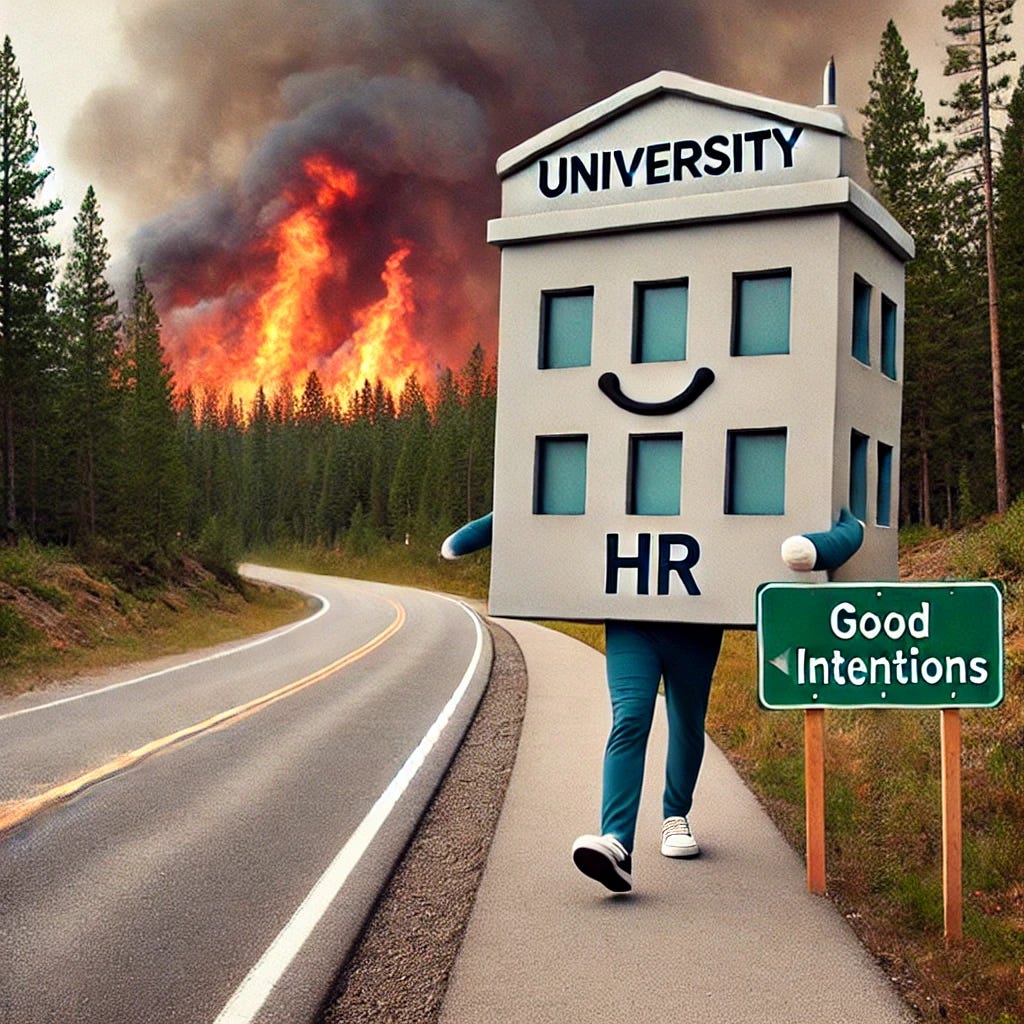"JUST SUE THEM!" (is rarely so simple or advisable)
"Just Sue Them" - Five Reasons Why It's Not So Easy. Look for the song button below and listen to it :)
If you believe in the importance of free speech, subscribe to support uncensored, fearless writing—the more people who pay, the more time I can devote to this. Free speech matters. I am a university professor suspended because of a free speech issue, so I am not speaking from the bleachers. The button below takes you to that story if you like.
Please subscribe to receive at least three pieces /essays per week with open comments. It’s $5.75 per month, or about USD 4. Everyone says, “Hey, it’s just a cup of coffee.” (With me, it's not per day but just one per month.) But if you’re like me, you go, “Hey, I only want so many cups of coffee!” I get it.
But I only ask that when you choose your coffee, please choose mine. Cheers.
_______________________________________________
I’ve got a retainer agreement on my table right now; I could sue my employer, and I could sue at least one staff member who, on staff time, claimed “inside sources” and went methodically calling out students and telling truly disgusting lies about me.
Just sue her, many say (I still might), but there are definite reasons why it’s not as easy as it seems. (the story is described here.)
I didn’t know I had so many friends who were legal experts. Defamation, human rights, going to the labour board, and contacting the HRTO! Everyone is an expert.
Suing someone conjures up images of the gavel slamming down, redemption, vindication, and victory. But I am not sure it is worth it.
When considering the trifecta of legal battles—defamation suits, human rights complaints, and labour board disputes—one might initially think these are ideal ways to gain justice and a sizable payout.
I have given up on my unions. They have not met me since the strike started and have refused to talk on the phone. I wonder if they will deliver doughnuts. I don’t know what they do. Their strategy is always, “Wait till you’re fired, and we might file a grievance, or we might not.”
Complaints against one’s union will fail because the deck is so slanted in one's favour. If they return one email, they are given enough good effort points to avoid recrimination. They are attending a university where if they attend one class and sign their name on the exam, they pass.
The pain of injustice is corrosive; it is different from other types of loss; it is not naturally healed by time, and it sits on your shoulders.
I am told I have an excellent defamation case against Guelph, Humber and many individuals within: the staff who didn’t exaggerate but deliberately lied and all with the full knowledge - and perhaps supervision - of management.
It is an odd experience; old friends tell others they believe you should be fired, but their impression is a collage of gossip, lies, and false assumptions.
But would a lawsuit heal all wounds?
I would love an apology letter from all three institutions that admit faults and admit that the criminal and negative career track record claims were utterly false.
I wish they would admit that their process is not a process at all; from day one, it has been a personal vendetta.
But an apology would not be enough, nor would money; I want the human rights manager who believes you have fewer rights if you are Jewish than if you are Muslim to be outright fired; I want all those who ignored pleas from me to stop their faculty and staff to stop lying to be sacked forthright. Good luck with that.
I want the student who outright lied to be stripped of their degree and Vashti Bagot, top left, who has caused so much damage, to be called to account. Not likely.
Of course, I will do whatever counsel advises me.
But just sue? Think again. Lawsuits, particularly in these areas, are a lot like buying a lottery ticket: a few minutes of fantasy, but more often than not, you end up with nothing but regret and legal fees.
Here are five key reasons why going down these paths is typically not worth the time, energy, or emotional toll.
1. Defamation Suits Are a Slippery, Costly Slope
You might imagine a defamation lawsuit as your ticket to clearing your name and making the offender pay figuratively and literally. Except, it rarely works out that way. Defamation cases are notoriously difficult to win. For starters, the burden of proof is high. The plaintiff must prove that the defendant made a false statement, that the statement was published (so far so good), that it caused harm, and —here’s the kicker—that it wasn’t protected speech, so unless the defamatory remark was some outright, unmistakable lie and has destroyed your life (not just bruised your ego), good luck winning.
Most of that is there, but proving damages is difficult. The irony is that my historically accurate calling of Hamas Nazis has put me on the docket.
At the same time, all legal analysis says the careers of the accuser, claimant, and HR manager should be in danger, not mine.
But power sometimes kicks justice’s ass.
Additionally, the cost of such a lawsuit can run into the tens of thousands of dollars. Legal fees, court costs, and endless hours rehashing the worst moments of your life—it’s no wonder most people just walk away. Even if you win, the reward is often a pittance compared to the financial and emotional cost.
Spending $50K to get $10K isn’t smart math. Although how many hundreds of thousands have they already spent on trying to get me fired? Oh sorry, that is taxpayer money, and that is unlimited, the board of Guelph and Humber will be lied to and manipulated and they will say, “nothing to see here.”
And don’t forget, proving damages in defamation is like proving that one dog loves you more than the other—it’s highly subjective and nearly impossible to quantify.
Firstly, even successful plaintiffs often face a “hollow victory.” Studies have found that defamation lawsuits, even when won, can feel unfulfilling, as courts focus more on financial harm than on rectifying personal reputations or emotional well-being.
Winning a defamation suit may help secure some public vindication, but research shows that plaintiffs seldom feel completely restored. Juries tend to award larger sums when defamation is tied to clear financial harm or emotional distress, such as a job loss or an impactful personal incident.
Still, the emotional damage itself is often hard to address. Even when monetary damages are awarded, the emotional toll from the litigation process often outweighs the perceived benefits.
The court action itself also retraumatizes the victim.
In my case, I already have been 100% medically confirmed that I have PTSD caused by the University of Guelph and Humber’s harassment, and I’m not looking for more sleepless nights and tingling fingers in the remote chance of justice.
I don’t believe justice is available within the Collective Agreements, HRTO or in-house Human Rights departments. They are amateurs, simply carpenters busy creating Potemkin Village illusions of decency.
2. Human Rights Complaints Only Favor Protected Groups
Human rights tribunals have a noble cause: protecting marginalized individuals from discrimination. But nobody got the road to hell memo on this one.
But let’s be real: if you’re not in a “protected class,” don’t even bother filing. These courts prioritize cases based on race, gender, sexual orientation, disability, and other such categories. The HRTO in Ontario doesn’t even have a mechanism to deal with false accusations; respondents are assumed guilty, Claimants are protected and paid for, and they have nothing to lose.
It’s also very slow. Years. And there is no closure until it’s over.
Imagine taking years to file some appeal or claim, and the judge, who undoubtedly thinks that as a white male, you are automatically the spawn of Satan, mandates some course for your oppressor.
3. The Labor Board Won’t Fight Your Battles for You
If you’re an employee with a grievance, the labour board seems like a knight in shining armour, ready to defend your rights. Except it’s more like a knight in rusted armour who’s usually several years late to the party and can barely move.
Labour boards are designed to mediate disputes between employees and employers, but their goal is not to punish bad employers—it’s to encourage “settlements” and “understanding.” This means both parties are pushed toward a resolution that leaves everyone equally unhappy.
Even if you do win, the penalties employers face are often trivial. They might be forced to pay back wages or reinstate you. Labour boards lack the teeth to impose serious penalties that deter bad behaviour.
Don’t even consider getting compensation for emotional distress or punitive damages; that is outside their scope.
At best, you’ll be looking at a modest financial settlement that won’t cover your therapy bills for the PTSD your former boss gave you. Mine are already in the thousands.
4. Winning Doesn’t Mean Winning Big
Let’s assume momentarily that you win your defamation suit, human rights complaint, or labour board dispute. What then? Good luck collecting anything meaningful unless your offender is a wealthy corporation or high-profile individual. Defamation suits, in particular, rarely lead to large payouts unless you’re a celebrity or public figure with serious damages. Most of us common plebs will see only nominal damages, if anything at all.
With human rights complaints, even if the tribunal rules in your favour, you’re unlikely to walk away with more than a small monetary award—if that. Many tribunals focus on non-financial remedies like policy changes or apologies. This is great for changing the system but won’t help you pay your bills. As for labour board disputes, the winnings typically amount to back pay or modest compensation, which is hardly worth the emotional strain and time commitment.
5. The Emotional and Time Costs Are Astronomical
Perhaps the strongest reason not to sue or file complaints is the emotional and psychological toll these processes take. Lawsuits and tribunal complaints are slow, stressful, and invasive. You’ll have to repeatedly relive the worst moments of your experience, answer questions, provide documentation, and sit through depositions.
I am already one person with little support, a union that is as anti-semitic as my accusor, and I somehow think that the arbitrator will not have a Damascus movement of self-awareness and offer legitimate damages.
Conclusion
In conclusion, while the idea of “getting justice” through defamation lawsuits, human rights complaints, or labour board disputes may sound appealing, the reality is that these legal avenues are often more trouble than they’re worth. The costs—both financial and emotional—frequently outweigh the benefits. So before you embark on this journey, consider whether it’s worth the battle or if it’s better to cut your losses and move on.
What to do? I'm not sure, but I will not close doors. There is the Court of Public Opinion.
The Old Testament frequently emphasizes that God will ultimately vindicate the righteous:
“No weapon formed against you shall prosper, and you shall condemn every tongue which rises against you in judgment.”1
___________________________________
Isaiah 54:17









